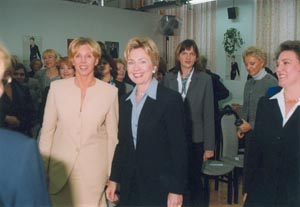Peggy Simpson
- 1999

Fellowship Title:
- Polish entrepreneurs after the economic shock therapy of 1990
Fellowship Year:
- 1999
Polish Entrepreneurs after the 1989 Roundtable
Research chemist Malgorzata Dudek had worked for two decades at the technical university in Gliwice and in 1983 decided she wanted to apply that knowledge in a startup business. That proved too daunting. Her own knowledge was not the problem. She knew the state-owned chemical industry well and had tentative orders to make components for a nearby plant. But under state socialism, individuals could not simply open a business. They had to get permission from the local government. And the Gliwice doorkeepers said no, in a variety of ways, over the next five years. The Polish communist politicians were skeptical if not hostile toward private business, even in the 1980s when party officials were experimenting with ways to revive the stagnating “shortage economy.” There were no clearcut rules to qualify to start a business; this was a political rather than an economic decision. Sixteen years later, Dudek said the gist of the city disapproval was that “I was a scientist and I should go back and stick to scientific research. I shouldn’t have anything to

Women Entrepreneurs in Poland
An unexpectedly large number of new businesses in Poland today are owned by women. Many are doing quite well, in manufacturing as well as in the service sector, helping propel Poland on its fast-track path toward a competitive market economy. Today, women are estimated to own 20 percent of the small to medium-sized businesses (from 5 to 50 employees). They own another 18-19 percent of the total, as sole propriators. Hillary Clinton meets with Polish entrepreneurs and is photographed next to Ewa Plucinska of EVIP International, a consulting firm. It remains unclear how and why this is happening. The cynical view is that women got their footing in the market economy before Western-style discrimination had a chance to take root and hold them back. Another is that state socialism was good training for the flexible skills demanded by the new democratic market economy. Unlike men, women not only held down fulltime jobs but also handled virtually all the domestic duties in the era of shortages and few labor-saving devices. There are other factors at work,
